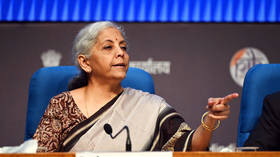Russiagate eats itself: Democrat 'tech experts' try their hands at election meddling, report reveals

A group of Democrats working in secret replicated the deceptive social media tactics they claim Russians used to steal the 2016 election in order to win the 2017 Alabama Senate race, according to an explosive NYT report.
The primarily social-media-based campaign to bolster the candidacy of Democrat Doug Jones and smear Republican Roy Moore implemented many of the divisive techniques outlined in the reports released earlier this week on Russian social media influence operations, according to an internal report on the effort acquired by the New York Times. Such resemblance is not surprising, given that one of the Alabama effort's ringleaders was Jonathon Morgan, whose company New Knowledge produced one of those reports.
Also on rt.com Racist ‘Russians’ targeted African-Americans in 2016 election ploy, reports claimThe campaign was clearly meant to remain classified – the Times' attempts to interview participants were as often as not met with claims of "I don't remember" or pleading the Fifth. Others downplay the effect of their actions, or claim they were just meddling in the name of research. But, as much as they claim their actions had no consequences, they succeeded in electing the first Democrat to represent Alabama in the Senate for over 25 years.
In order to paint Roy Moore as the Kremlin candidate, the manipulators linked his campaign to thousands of Russian Twitter accounts that all started following him at once – drawing the attention and suspicion of the media, which obediently published rumors that his support numbers were artificially bolstered by Russian bots.
Morgan claims the botnet "false flag" – a term that actually appears in the report – "does not ring a bell," dismissing the project as "a small experiment" in tactics that were not meant to sway the election. He pleads the Fifth on the report's claims that the Alabama project intended to "enrage and energize Democrats" and "depress turnout" among Republicans, weaponizing accusations that Moore had tried to seduce teen girls while in his 30s. Morgan also claims to forget the names of the Twitter and Facebook accounts he set up to manipulate Moore voters.
Backed into a corner, Morgan finally opted to lie to the Times, claiming that while the project did create a generic Facebook page to lure conservative Alabamans, and was in contact with write-in candidate (and Moore rival) Mac Watson, its influence efforts stopped there. The report tells a different story: the Facebook page "boosted" Watson's campaign, getting him interviews with major media outlets, and swelling the ranks of his Twitter followers. Watson confirms he received media assistance from a Facebook page with no human face to it – the only page that replied to his contact.
"The research project was intended to help us understand how these kind of campaigns operated," Morgan told the Times. "We thought it was useful to work in the context of a real election but design it to have almost no impact."
It's a truism that so-called "coastal elites" have only disdain for Middle America, but the way Morgan describes the Alabama special election as an inconsequential throwaway contest fit only for a science experiment is eye-opening.
Morgan, it's worth noting, was one of the developers of the infamous "Hamilton68" dashboard, beloved by Western media for its ability to link any troublesome narrative to "Russian bots." Morgan's co-developer, Clint Watts, has since distanced himself from the bot crusade, admitting he's "not convinced on this bot thing."
Everyone the Times spoke with was careful to shunt blame elsewhere. Renee diResta, who works with Morgan at New Knowledge and was the lead author of the group's Russian report, said: "I know there were people who believed the Democrats needed to fight fire with fire," emphasizing that she was not one of these people.
Moore campaign operatives remain frustrated at their narrow margin of loss – just 21,924 votes, less than the number of write-in ballots that were cast. They complained to Facebook about possible interference but were brushed off. Presented with incontrovertible evidence of wrongdoing by their opponents, Moore campaign manager Rich Hobson acknowledged that "any and all of these things could make a difference."
"We still kick ourselves that Judge Moore didn't win," he said.














